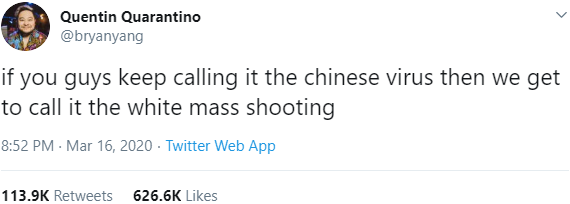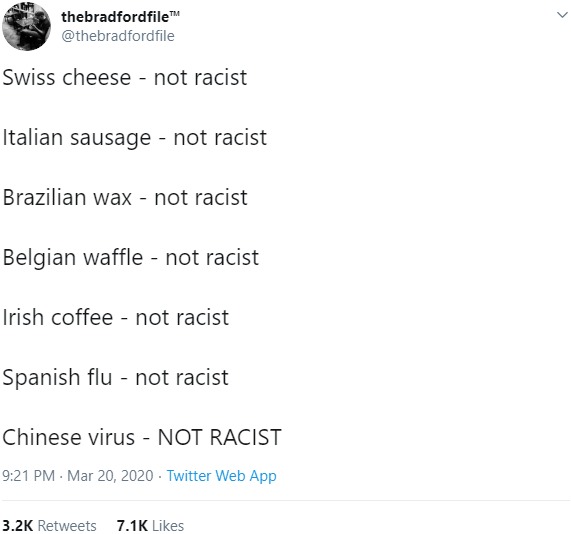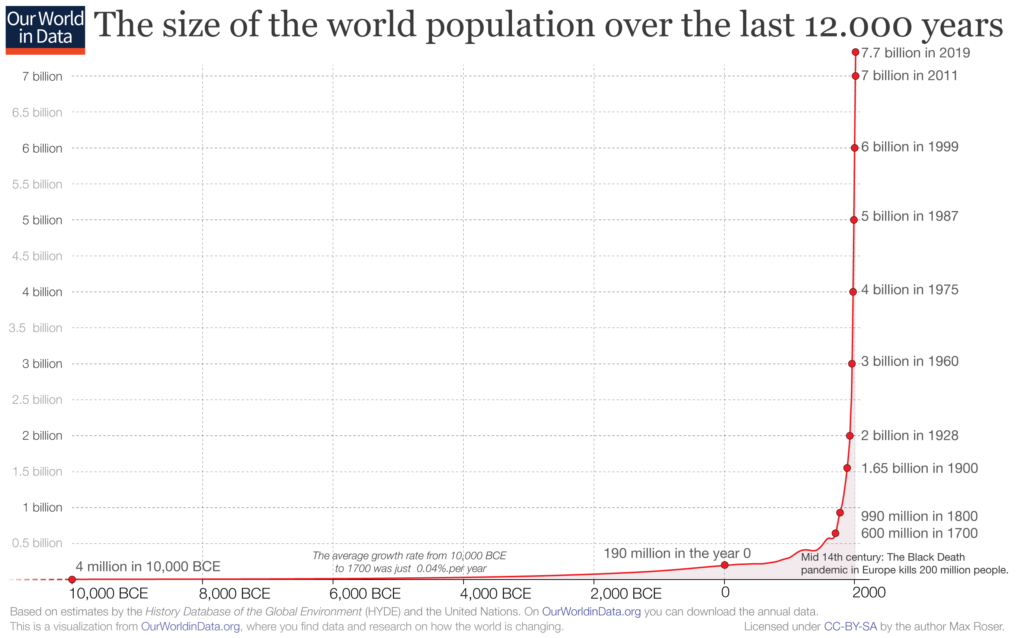Following Donald Trump’s lead, some conservatives have taken to vocally, and sometimes gleefully, blaming China for the current pandemic. For example:

On the one hand, this tweet has the decency and clarity to specify the Chinese Communist Party, instead of more broadly impugning the people of China, or people of Chinese descent around the world. But on the other hand, by flatly saying that the Party “did this,” the tweet becomes rather laughable bullshit.
Many liberals push back hard, resisting any attribution of the virus to China, and seeing racism behind each and every attempt. But unfortunately that too is actually bullshit.
So here, for any fellow weirdos obsessed with precision and clarity and nuance, I’ll try to untangle the senses in which China is and is not responsible for the coronavirus.

First off, discounting the prospects that the virus was actually developed as a bioweapon (whether in China, as claimed by some American conspiracy theorists, or in America, as claimed by some Chinese conspiracy theorists) the fact is that the virus probably originated in bats, and then made the jump to humans through some intermediary species, and this happened in the city of Wuhan in China. So in this particular sense, yes, the virus is indeed Chinese.
Here some liberals scream that viruses don’t have any nationality. And if that’s intended to mean that a Chinese virus is not Chinese in the same way that a Chinese person is Chinese, then it’s certainly true.
But… an American movie isn’t American in the same way that an American person is American, and french fries aren’t French in the same way that a French person is French, and a Brazilian wax isn’t Brazilian in the same way that a Brazilian person is Brazilian. So I’d say it’s pretty clear that there are multiple ways in which we use words about nationality.

But that may not be the whole story. Because for one thing, there seem to be some salient differences between the various products and practices that we label with words of nationality, on the one hand, and, you know, a deadly pandemic, on the other. Let’s consider two of those differences.
One is that while the virus originated in China, it then spread itself all over the world, rather than being actively embraced elsewhere like national products or practices are. Another difference is that the virus is simply and straightforwardly awful, while the products and practices all have their virtues. So adopting terminology that more closely or emphatically associates the virus with China seems aimed at just shitting on China, unlike the other sorts of nationality-based terminology.
Consider some partial parallels. Gunpowder was invented in China, and for obvious reasons it then spread throughout the world. But it would make little sense to insist on calling it Chinese gunpowder, and even less sense to imply some unique Chinese guilt in all the gunpowder-related deaths that have followed. Or consider that the Industrial Revolution began in Britain, and immediately put us on the path toward climate catastrophe—but it would be hard to make a case for now talking of British climate change. Similarly, while America invented nuclear weapons, I haven’t heard anyone push us to speak of stopping Iran’s American nuclear program, or preventing American nuclear war between India and Pakistan, or avoiding global American nuclear annihilation.
But here some will argue that things are different with this virus, since it likely passed to humans through pangolins or civets, which are eaten in China but not in most other places, after having originated in bats, which are likewise eaten in China but not most other places.
Some will answer back that this is just cultural imperialism. Westerners think it’s disgusting to eat bats, but that’s no different from a Muslim thinking it’s disgusting that Westerners eat filthy swine. And that’s true as far as it goes. But it’s not the full story. Because there does indeed exist in China, in some places more than others and among some groups more than others, a preference for what might be called exotic meat, which does elevate the risk for zoonotic diseases. This involves eating a wide range of animals, many of them caught in the wild, and many of them transported and sold alive, as in the wet markets of Wuhan. These practices stem from beliefs associated with traditional Chinese medicine, as well as from more familiar considerations like novelty and prestige. So in this sense too, the coronavirus is indeed Chinese.
But to see that point in isolation is to see it wrongly. Because for one thing, exotic meat can be found much closer to home, for example in Americans eating alligator, rattlesnake, possum, or armadillo. But in addition, the zoonotic diseases that cross from animals to humans do not require exotic animals. Just think of swine flu or mad cow disease. And just as the conditions in Chinese wet markets elevate the risks of such diseases, so too do conditions on Western factory farms. So while the next new disease might come from a wet market in China, or from bush meat in Africa, it could just as easily come from a veal crate in Texas or a battery cage in Iowa.

Another important piece of context is that while such practices raise the risks of new diseases, they don’t create those risks. Disease is a constant throughout nature. And the relation between viruses and bacteria and the particular organisms they infect is what’s known as an evolutionary arms race, like those between perceptive predators and camouflaged prey, or between fast predators and fast prey. How this works is that, for example, slower gazelles are eaten by cheetahs, slower cheetahs starve, faster members of both species survive and reproduce, and over evolutionary time both species get faster.
Since gazelles and cheetahs have similar lifespans, they compete on a relatively level playing field. But that’s not at all the case in the arms race between us and the viruses and bacteria that infect us. Because for us, the time from one generation to the next is about 20 to 30 years. But for viruses a generation passes in as little as a day, while for bacteria it’s as little as 10 fucking minutes. They run circles around us. And while we have to defend against attack after attack, they only have to breach our defenses once.
That’s why, in a world crammed with nearly 8 billion humans, pandemics are inevitable. So while this present pandemic started in China, that’s in some senses just dumb luck; one was bound to start somewhere, and more are bound to follow. All thoughtful observers knew this. (Unfortunately President Trump is not a thoughtful observer, and not inclined to listen to those who are.)

So it would seem that in most senses, the fact that the coronavirus arose in China is not China’s fault, or at least that the relevant faults are shared by plenty of other nations.
But that only brings us up to the point when the virus arose. The response of Chinese authorities after that is another matter. And we now know that Chinese authorities alternately ignored and suppressed the many early reports of illness in Wuhan. By doing so, they may have blown our one and only shot at stopping this pandemic before it began. This seems like by far the gravest sense in which the virus is China’s fault. And in some senses the thousands or millions of deaths that we’re now facing can be attributed to the particular Chinese authorities who failed us, and to the broader political system in which they operate.
But here again, seeing this point in isolation means seeing it wrongly. A great deal of context could be given, but I want to make just two points. One is that Trump and his supporters have little standing to criticize early Chinese mistakes. That’s because Trump himself ignored, suppressed, and lied about the early warnings that he received starting in January, and this came after earlier mistakes that had already degraded America’s general readiness to respond to a pandemic. And Trump continued on this path even after any intelligent person should have known better simply from information that was available to the public. Meanwhile, to this day he continues to say things that encourage his supporters to underestimate the seriousness of our situation, while also taking and contemplating various concrete actions that are going to get thousands of Americans killed.
The second point is that political systems involve trade-offs. The very things that make a system good at certain tasks also make it bad at others. And in the case of authoritarian China, some of the very factors that contributed to its early mistakes have also contributed to its later successes, both in containing the virus at home and in offering aid abroad.
So in the end, what does all this mean? Is the coronavirus ultimately China’s fault or not?
Well, like most questions, this one admits of no simple and magical yes or no. That’s because the question itself is not simple and magical, but can be intended to express one or more of a large set of questions, each having its own answer, with its own nuances and debates and uncertainties.
Notes
1) Here I’ve used the terms “conservative” and “liberal” broadly and loosely, to mean roughly those who align themselves on, respectively, the right/conservative/libertarian/Republican side, or on the left/progressive/centrist/Democratic side, of the current American political spectrum.
2) I noted how beliefs associated with traditional Chinese medicine contribute to wet markets, and consequently to the coronavirus, not to mention contributing to a ton of needless animal suffering. Some Westerners might scoff that such beliefs are strange, backwards, or unscientific. But for proper context, consider Western beliefs like creationism, a young earth, or an impending rapture; and the hostility to science, and the broader anti-intellectualism, to which such beliefs contribute; and all the harms that result.
3) In briefly discussing why viruses and bacteria evolve much faster than we do I mentioned only our very different lifespans. But there are also differences in genetic recombination and in mutation rates.
4) I didn’t get into the topic of racism. But some of what would need to be said is sketched here.